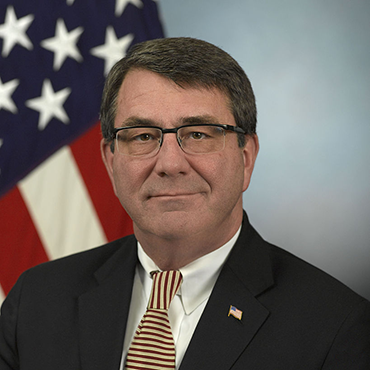Senators renew calls for cyber deterrence
Lawmakers continue to press the Obama administration to take more forceful action against alleged Russian hacking in order to deter future cybercrimes.

At a Senate hearing, lawmakers pressed Defense Secretary Ash Carter (above) to take more forceful action against alleged Russian hacking in order to deter future cybercrimes.
Senators continue to press the Obama administration to take more assertive action against Russia for its alleged hacking of U.S. political and election systems.
During a Senate Armed Services Committee hearing focusing on the battle against the Islamic State group, Sen. Deb Fischer (R-Neb.) pressed Secretary of Defense Ash Carter and Gen. Joseph Dunford, chairman of the Joint Chiefs of Staff, to "impose costs" on those responsible for cyberattacks on the U.S. political process.
When Fischer asked whether penalties should be imposed in a public way to deter future hacks, Carter responded by saying, "I certainly think that we need to defend ourselves and take action against perpetrators when we identify them."
He stated that cyberattacks can be committed by nation-states, hackers or criminal gangs, which is part of the challenge of identifying who is responsible and deciding how to respond.
The issue has come to the fore because of recent hack and attempted hacks against U.S. political party and voting infrastructure targets.
Sen. Dianne Feinstein (D-Calif.) and Rep. Adam Schiff (D-Calif.), the ranking Democrats of the Senate and House intelligence committees respectively, issued a joint statement about allegations of Russian involvement.
"Based on briefings we have received, we have concluded that the Russian intelligence agencies are making a serious and concerted effort to influence the U.S. election," they said. "At the least, this effort is intended to sow doubt about the security of our election and may well be intended to influence the outcomes of the election -- we can see no other rationale for the behavior of the Russians." They suggested that such orders "could only come from very senior levels of the Russian government."
Picking up on such concerns at the hearing, Fischer said all the evidence points to Russia as the sponsor of the hacks on the Democratic National Committee, "and when we have an adversary who so brazenly strikes at the heart of our democratic process, I think that indicates how low they believe the cost of that behavior is going to be. I think we've possibly lost the deterrence factor when it comes to cyberattacks. Would you agree with that?"
"We can't lose deterrence effect ever," Carter said, adding that for the past 25 years, the U.S. has not had to stress Russian containment as a major component of defense strategy. "But now we do."
He said investing in cyber capabilities and strategy is part of the renewed focus on Russia.
Fischer continued to press for more specifics and a clear plan for "how the attacks are going to be addressed whether through deterrence or through actual actions.… Are those plans updated as we continue to see the expansion of cyberattacks on this country?" she asked.
Carter said the U.S. is building an array of cyber capabilities across the military services and Cyber Command, but he did not elaborate.
Dunford said the Defense Department is in the process of rewriting its entire strategy to address Russia's more aggressive posture in the world.
"In some cases, a cyberattack may not get a cyber response," he added. "We want to make sure a national command authority has a full range of options."
Sen. Kirsten Gillibrand (D-N.Y.) asked how the government could create an integrated framework for responding to cyberattacks, "and what is DOD's role?"
"The department shares this responsibility with law enforcement and [the Department of] Homeland Security and intelligence, but we aim to play a big role," Carter said. "Our first job is the defense of our own networks. We also do develop cyber offense. We've acknowledged that in the last year."
Dunford said offensive cyber is one of the options in the new strategy but other tools could be used to respond to any future Russian hacks.
The Obama administration released a presidential policy direction on cyber incident coordination, known as PPD-41, in July, but the plan does not provide details on DOD's roles and responsibilities in response to cyberattacks.
Furthermore, experts have argued that deterrence in the classic Cold War sense is difficult, if not impossible, to apply to the cyber environment.
Although the U.S. has offensive cyber capabilities, there are questions about whether an attack or the use of sanctions or other political and economic tools to deter cybercrime would result in escalation or other unintended consequences. That is why a number of experts argue that deterrence comes from strong defense and resiliency rather than purely offensive capabilities.
At the end of the hearing, Sen. Angus King (I-Maine) asked whether Cyber Command should be turned into an independent combatant command.
"That's not a decision we've taken yet, but that will be a natural evolution for us and is going to be part of the natural evolution of our cyber force," Carter said.
He added that any decision on the future of Cyber Command would require presidential action and input from the Senate Armed Services Committee. A number of senators have expressed opposition to separating Cyber Command from the National Security Agency, including Committee Chairman Sen. John McCain (R-Ariz.).





